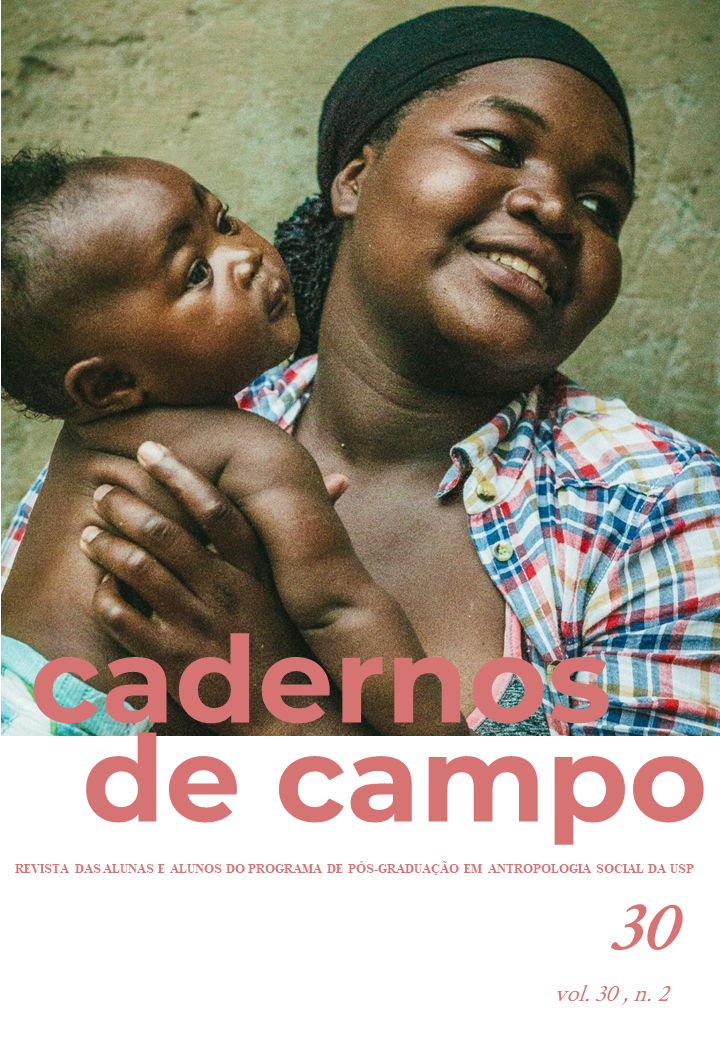Nangui tereka, hablando duro en la vida política de las mujeres Waorani
DOI:
https://doi.org/10.11606/issn.2316-9133.v30i2pe193463Palabras clave:
hablar duro, liderazgo feminino, Amazonia, WaoraniResumen
Este artículo explora la participación de las mujeres Waorani de la Amazonía ecuatoriana, en lo que ellas reconocen como la vida política. Esta noción, en comunidades ubicadas cerca de carreteras petroleras, hace referencia a los encuentros y negociaciones con Otros. La vida política local, en estas comunidades, es una expresión de resistencia Waorani distinta, aunque complementaria, a las grandes demostraciones anti-extractivas que han llamado la atención de la opinión pública e investigadores. El artículo ofrece un aporte a los estudios amazónicos sobre liderazgo al explorar un discurso denominado nangui tereka (hablar duro), un arte perfeccionado por varias mujeres Waorani. Hablar duro es una forma de expresar la fuerza o valentía (piñe, pienguimamo), que se cultiva a lo largo de la vida a través de una serie de prácticas corporales intergeneracionales.
Descargas
Referencias
Alès, C. (2003). Función simbólica y organización social. Discursos rituales y política entre los Yanomami. In C. Alès & J. Chiappino (Eds.), Caminos Cruzados. Ensayos en Antropología Social, Etnoecología y Etnoeducación (pp. 197–240). IRD Editions.
Århem, K. (2000). From Longhouse to Village: Structure and Change in the Colombian Amazon. In K. Århem (Ed.), Ethnographic puzzles : essays on social organization, symbolism and change /Kaj Århem. (pp. 55–92). London : Athlone.
Bravo Díaz, A. (2020). Notas Amazónicas frente a la pandemia, el caso Waorani en Ecuador. Revista Periferia, 25(2). https://doi.org/https://doi.org/10.5565/rev/periferia.742
Bravo Díaz, A. (2021). “Sumak kawsay Is Harmful for All of Us” Oil Roads and Well-being among the Waorani in Ecuadorian Amazonia. Latin American Perspectives, 48(3), 51–68.
Brightman, M. (2007). Amerindian Leadership in Guianese Amazonia. Doctoral dissertation, Cambridge: Cambridge University.
Brightman, M. (2016). The imbalance of power : leadership, masculinity and wealth in the Amazon. New York : Berghahn.
Clastres, P. (1987). Society against the state : essays in political anthropology (R. Hurley & A. Stein (eds.)). Zone Books.
Conklin, B. (1997). Body paint, feathers, and VCRs: Aesthetics and authenticity in Amazonian activism. American Ethnologist, 24(4), 711–737.
Gallois, D. (2002). “Nossas falas duras”. Discurso político e auto-representação Waiãpi. In B. Albert & A. Ramos (Eds.), Pacificando o branco: cosmologias do contato no norteamazônico (pp. 205–237). Editora UNESP.
Guzmán-Gallegos, M. (2015). Amazonian Kichwa Leadership:: The Circulation of Wealth and the Ambiguities of Mediation (F. Santos-Granero (ed.)). University of Arizona Press.
High, C. (2007). Oil development, indigenous organisations, and the politics of egalitarianism. Cambridge Anthropology, 26(2), 34–46.
High, C. (2010). Warriors, hunters, and Bruce Lee: Gendered agency and the transformation of Amazonian masculinity. American Ethnologist, 37(4), 753–770. https://doi.org/10.1111/j.1548-1425.2010.01283.x
High, C. (2018). Bodies that speak: Languages of differentiation and becoming in Amazonia. Language and Communication, 63, 65–75. https://doi.org/10.1016/j.langcom.2018.02.005
Lévi-Strauss, C. (1944). The Social and Psychological Aspect of Chieftainship in a Primitive Tribe: the Nambikuara of Northwestern Mato Grosso. York, Transactions of the New Academy of Science, 7, 16–32.
Nahum-Claudel, C. (2018). Vital diplomacy : the ritual everyday on a dammed river in Amazonia / by Chloe Nahum-Claudel. New York .
Narváez, R., & Trujillo, P. (2020). Tiempos de guerra y tiempos de paz continuum simbólico de un pueblo de reciente contacto el caso etnográfico de los waorani en la amazonía ecuatoriana. Cadernos de Campo, 29(1), 13–37. https://doi.org/10.11606/issn.2316-9133.v29i1p13-37
Overing, J., & Passes, A. (2000). Introduction. In J. Overing & A. Passes (Eds.), The Anthropology of Love and Anger : The Aesthetics of Conviviality in Native Amazonia (pp. 1–30). Routledge.
Passes, A. (2004). The place of politics: powerful speech and women speakers in everyday Pa’ikwené (Palikur) life. The Journal of the Royal Anthropological Institute, 10(1), 1–18. https://doi.org/10.1111/j.1467-9655.2004.00177.x
Rival, L. (2002). Trekking through history : the Huaorani of Amazonian Ecuador. Columbia University Press.
Rival, L. (2005). The attachment of the soul to the body among the Huaorani of Amazonian Ecuador. Ethnos, 70(3), 285–310. https://doi.org/10.1080/00141840500294300
Sempértegui, A. (2019). Indigenous Women’s Activism, Ecofeminism, and Extractivism: Partial Connections in the Ecuadorian Amazon. Politics and Gender, . https://doi.org/10.1017/S1743923X19000023
Sempértegui, A. (2020). Decolonizing the Anti-Extractive Struggle: Amazonian Women’s Practices of Forest-Making in Ecuador. Journal of International Women’s Studies, 21(7), 118–134.
Uzendoski, M. A. (2018). Amazonia and the cultural politics of extractivism: Sumak Kawsay and Block 20 of Ecuador. Cultural Studies, 32(3), 364–388. https://doi.org/10.1080/09502386.2017.1420095
Vallejo, I., & García-Torres, M. (2017). Mujeres indígenas y neo-extractivismo petrolero en la Amazonía centro del Ecuador: Reflexiones sobre ecologías y ontologías políticas en articulación. Brújula (Enfoques), 11(1), 1–43.
Viveiros de Castro, E. (1996). Images of Nature and Society in Amazonian Ethnology. Annual Review of Anthropology, 25(1), 179–200. https://doi.org/10.1146/annurev.anthro.25.1.179
Zanotti, L. (2012). Resistance and the politics of negotiation: women, place and space among the Kayapó in Amazonia, Brazil. Gender, Place & Culture: A Journal of Feminist Geography, 20(3), 346–362.
Descargas
Publicado
Número
Sección
Licencia
Derechos de autor 2021 Cadernos de Campo (São Paulo, 1991)

Esta obra está bajo una licencia internacional Creative Commons Atribución-NoComercial-CompartirIgual 4.0.
Autorizo a Cadernos de Campo a publicar el trabajo de mi autoría/responsabilidad, así como me responsabilizo por el uso de imágenes, si se aceptada su publicación.
Estoy de acuerdo con esta declaración como una expresión absoluta de la verdad y confirmo el carácter inédito de la obra presentada. Asumo la plena responsabilidad del material presentado en mi nombre y en el de los eventuales coautores





